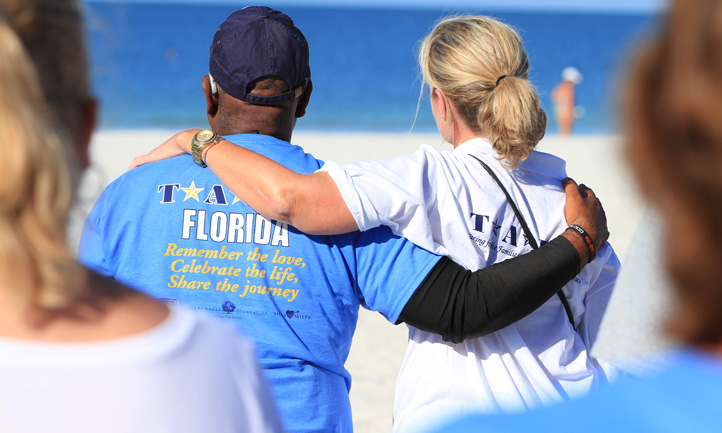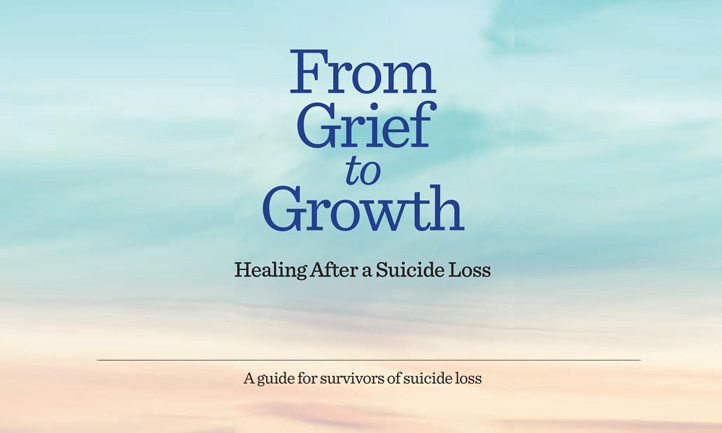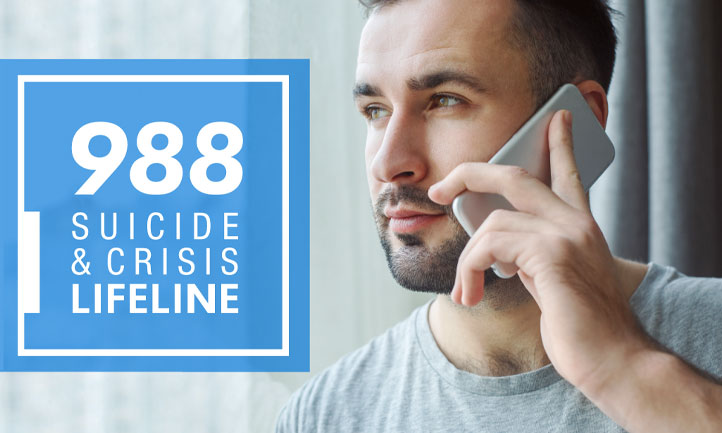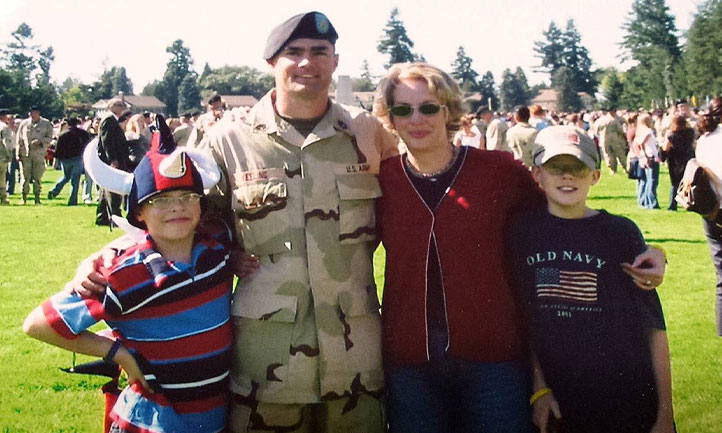National Suicide Prevention Month: TAPS Support and Resources
Author: Carla Stumpf Patton
Each September we recognize Suicide Prevention Month, and while every day of the year is an opportunity for awareness, this time of the year specifically we emphasize education and sharing life-saving resources on all issues related to suicide—also referred to as prevention, intervention, and postvention. For those who are suicide loss survivors or attempt survivors, these topics can take on a much deeper meaning and bring about many thoughts, feelings, and reactions.
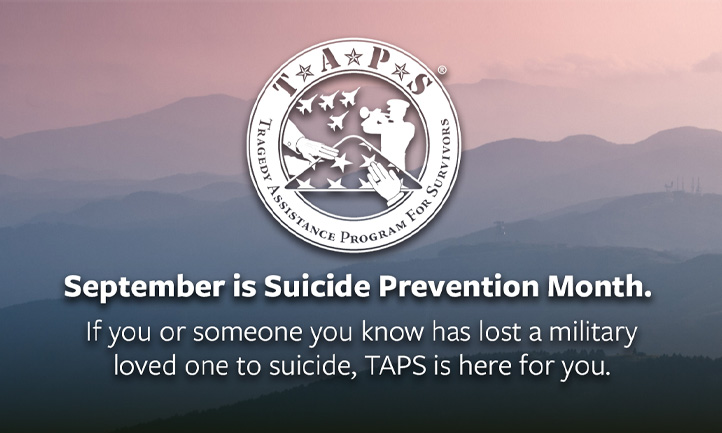
September can be overwhelming for bereaved survivors, as media outlets will be highly concentrated on “prevention” efforts, leaving survivors who are often in the postvention phase feeling like they should have known or done more to help save their loved one. As we have come to learn over the years about the complexity of suicide and it not being caused by any one factor, survivors often come to learn that they did the best they could with the knowledge and skills they had at the time. We’ve learned that from our own tragedy, perhaps the lessons learned can help prevent this happening to someone else.
While prevention efforts cannot bring back our loved ones, it is very common for prevention to be an issue of critical importance to those who have been impacted the most. As a long term survivor myself, losing my military spouse to suicide in 1994, my loss is what personally inspired and empowered me to work in this field. I’ve had the honor to journey alongside thousands of fellow survivors and have found similar experiences among most, if not all, where prevention of suicide becomes a personal priority to various degrees.
In fact, it is the survivor and all those with lived experiences who have been the driving forces behind changing how we treat and respond to suicide; this has helped shift the conversation and inspire ways to help save lives by informing the public. By talking openly about suicide, inviting dialogue to reduce stigma, and sharing reputable, best-practice resources, we see first hand how it can save lives and reduce risk in service members, veterans, and impacted families. Talking, sharing and connecting can also help in the healing of one's grief. It can empower those grieving a suicide loss to have a voice for prevention. Perhaps it helps keep the memory of one's loved one alive. Maybe it offers the life-affirming feeling that their loved one’s death was not in vain. And for many, it helps to rebuild our own identity when we do something to take action that is purposeful and meaningful.
TAPS is honored to be a leader among these efforts, and as we kick off National Suicide Prevention Month, we’re sharing resources available to those looking to get involved in suicide prevention or those seeking help.
Suicide Prevention Resources
Our TAPS Suicide Prevention and Postvention page is dedicated to offering immediate support and filled with valuable information, such as a welcome for new survivors, subject matter articles and handouts (such as How to Talk to Children About Suicide), links to the TAPS Suicide Postvention ModelTM, and much more.
Read more about programs, resources, and ways we can be of support on the TAPS Suicide Prevention and Postvention page.
Produced by TAPS and adapted from the TAPS Suicide Postvention ModelTM, this guide was written by survivors, for survivors, and will give you a roadmap to guide you on your journey of grief.
Read the From Grief to Growth: Healing After a Suicide Loss Guidebook.
We all can do our part at preventing suicide, starting with the resources to seek support and help from the new, “988” Suicide & Crisis Lifeline and Veteran’s Crisis Line (Veterans press 1). The Transition to 988 on July 16, 2022, is an important step forward and offers an unprecedented opportunity to strengthen and transform crisis care in our country.
Read more about the 988 Suicide and Crisis Lifeline.
Military, Government Agencies and Organizations
DSPO advances holistic, data-driven suicide prevention in the military community through policy, oversight, and engagement to positively impact individual beliefs and behaviors, as well as instill systemic culture change.
Defense Suicide Prevention Office website »
The VA’s top clinical priority is preventing suicide among all Veterans—including those who do not, and may never, seek care within the VA health care system.
U.S. Department of Veterans Affairs website »
In 2017, TAPS partnered with the Home Base Program to establish the Intensive Clinical Program for Families of the Fallen (ICPFF), a groundbreaking, two-week outpatient treatment program designed for Survivors of Fallen Warriors. Learn more about TAPS partnership with Home Base.
Home Base Program website »
Stop Soldier Suicide provides consistent, safe, confidential care that saves lives. Through their proactive and disruptive approach, they are focused on meeting at-risk individuals where they are, serving all service members, veterans, and military families from every branch and every generation, regardless of discharge status.
Stop Soldier Suicide website »
Vets4warriors is a national 24/7-peer support network for veteran and military communities 100% staffed by trained veterans and members of the military community, their families or caregivers.
Vets4warriors website »
SAMHSA’s Service Members, Veterans, and their Families Technical Assistance (SMVF TA) Center serves as a national resource to support states, territories, and local communities in strengthening their capacity to address the behavioral health needs of military and veteran families.
Substance Abuse and Mental Health Services Administration website »
Leading Suicidology Organizations
Upcoming Events
Battle Rhythms are collaborative presentations hosted by America's Warrior Partnership that provide resources and information to benefit veterans, their families, caregivers, and other veteran-serving organizations/professionals. Our Senior Director of Postvention Programs Dr. Carla Stumpf Patton will join other leading voices for a conversation surrounding the importance of suicide prevention.
Register on the America's Warrior Partnership website »
TAPS has supported thousands of survivors of military suicide loss by offering them hope, healing, and renewed opportunities for personal growth. One way TAPS does this is through programs and services based on our TAPS Suicide Postvention Model™. Along with the TAPS Institute for Hope and Healing®, join Dr. Carla Stumpf Patton and other TAPS loved ones who are suicide survivors to talk about the critical connection between postvention and what suicide prevention means now after personal loss.
Register for the Suicide Awareness and Prevention Webinar »
Registration is still open for military suicide loss survivors wishing to attend the 14th Annual National Military Suicide Survivor Seminar (also known as NMSSS), either in person or virtually. We welcome you to join us for a powerful weekend of hope and healing among your peers and experts in the area of suicide, grief, and trauma.
Register to attend the National Military Suicide Survivor Seminar »
Training Opportunites
From creating a crisis response plan to learning more about postvention and healing after suicide loss, Psych/Armor offers free courses on Suicide Prevention, Intervention, and Postvention.
Register to attend on the Psych/Armor website »
In this 90-minutes online course, LivingWorks Start teaches trainees to recognize when someone is thinking about suicide and connect them to help and support.
Register to attend on the Livingworks website ».
NSTC training events focus on critical topics such as professional training, innovative suicide intervention approaches, treatment, and gatekeeper trainings.
See upcoming National Suicidology Training Center trainings »
Our Stories
Mental Health and the Military: Asking for Help When You Need It
Surviving father Jon Ganues shares the powerful story of seeking help when needed. “I challenge leaders at all levels, in all military services, to embrace supporting mental health and participating in suicide prevention every day,” he says.
Grieving in the Closet
Surviving son Chandler Keeling was in eighth grade when he lost his father to suicide. “I’ve chosen to honor my father the best way that I know how: by being my true and authentic self, and encouraging others to do the same,” he writes.
In the Midst of Grief: What we can Learn from our Children
Surviving spouse Amanda Gallagher shares her personal story and how, when all felt lost, her children gave her the strength and the ability to move forward in her grief. “My children have shown me what it means to be a living legacy… they have shown me they are up to the challenge of profound loss and complicated grief,” she writes.
Carla's Final Thought
Whatever the reasons may be that bring us each to this conversation, it is important to know this: in many cases, suicide can be prevented and lives can be saved. Nobody has to go through this alone or endure stigma or suffer in silence. The help is out there, it works, and with it comes hope and the ability to live a fulfilling life.
Suicide Postvention Grief Support: If you are a survivor coping with a military-related suicide loss and in need of postvention grief support, programs, or services, TAPS is here to help. Call the National Military Survivor Helpline at 800-959-TAPS (8277) or visit taps.org/suicide.
Dr. Carla Stumpf Patton, TAPS Senior Director, Suicide Prevention & Postvention Programs

